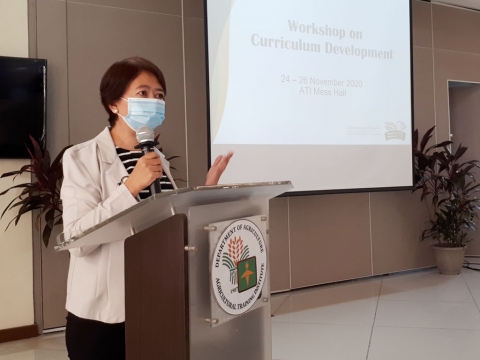CDMD chief Editha Vinuya underscores the Institute’s thrust to develop appropriate and relevant training programs during the curriculum development workshop among selected Central Office staff.
DILIMAN, Quezon City—The Agricultural Training Institute (ATI) re-defines its approach in training agriculture extension workers (AEWs) as it adopts the “new extensionist” concept of the Global Forum for Rural Advisory Services (GFRAS) in the design and development of its curriculum offerings.
The concept of the “new extensionist” asserts a new vision for extension and advisory services (EAS) within the agricultural innovation system (AIS) and its need for new capacities to respond effectively to the new challenges in agricultural development. To achieve this, GFRAS called for EAS capacity to be strengthened at the individual, organizational, and system levels and for the reform of curricula and learning materials “to better balance the training of extension professionals between technical and functional competencies.”
To heed this call, the ATI’s Career Development and Management Division (CDMD) has set forth activities to harmonize and standardize its training programs to further enhance the skills of AEWs in line with the identified “new extensionist” competencies.
“It is high time for the ATI to develop more training modules because the local government units (LGUs) expect us to train their extension workers who, in turn, will cascade [their knowledge to the farmers]. That is why we should have excellent standards here at the national level. That is our challenge,” Director Alfredo Aton said during the workshop on curriculum development spearheaded by the CDMD on November 24-26.
The activity is part of the ongoing efforts to develop a curriculum that would enable the Institute to systematically classify and offer training programs based on the food value chain, as well as GFRAS’ “new extensionist” concept. This is in support to the ATI’s role of strengthening the capacities of national government agencies, state universities and colleges, LGUs, and the private sector that make up the National Extension System.
The “new extensionist” competencies that have been identified include abilities in defining the AIS framework and their role within the system; selecting appropriate approaches and tools for a given context; managing extension programs; applying values and good principles in the profession; and practicing and implementing adult learning programs.
Other skills that an “new extensionist” should have are on basic knowledge management, facilitation for development, community mobilization, farmer organizational development, value chain extension, agricultural entrepreneurship, gender-sensitive approaches, and risk mitigation and adaptation.
Meanwhile, CDMD chief Editha Vinuya shared other efforts initiated by the Institute to further enhance the enabling environment for AEWs. These include a series of career development workshops, profiling activities, and competency assessment activities.
“We have done all these because we wanted to have the right information as inputs to the development of appropriate and relevant training curriculum,” she said.
With around 11,280 AEWs in the LGUs alone, Vinuya stressed the importance of re-assessing training and development programs towards professionalizing extension work in the Philippines. She also spoke of the urgent need to harmonize and standardize capability-building activities offered to extension workers, many of which are “duplicating one another.”
Prof. Elenita Que, from the University of the Philippines-Diliman, served as the resource person during the three-day activity. She discussed the definition, types, and components of a curriculum, and guided the participants in a curriculum mapping activity to identify gaps in the current ATI training programs for AEWs.
Assistant Director Rosana Mula also graced the presentation of outputs and urged the participants to come up with strategies on how to meet the competency needs of AEWs while also responding to the demand of other clientele.
Around 20 staff from the ATI Central Office divisions were present in the workshop held in this city.

